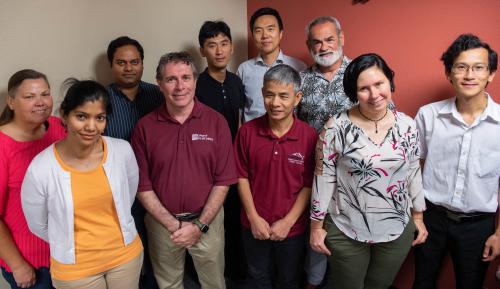NSF awards NMSU $5 million for Phase II of smart grid research

The National Science Foundation recently awarded New Mexico State University a second $5 million dollar grant to fund Phase II of collaborative smart grid research. The grant will help researchers build on success of the program over the past five years, which resulted in publication of 150 peer-reviewed papers.
The award through the NSF’s Center for Research Excellence in Science and Technology (CREST) seeks to strengthen and improve the efficiency, effectiveness and sustainability of the electric energy grid by addressing infrastructure challenges, security issues and working to create a highly trained and flexible workforce to support the future of the industry.
“The first phase was really focused on smart grids,” said Enrico Pontelli, principal investigator of the project and NMSU’s dean of the College of Arts and Sciences. “In the second phase we’ll see if we can take what we’re learning with smart grids and apply it to other problems. A lot of the problems we are addressing also can apply to other types of infrastructure.”
Pontelli’s vision for the center cuts across disciplines while offering students a course of study with a path to high-demand careers. NMSU Chancellor Dan Arvizu points to this second large NSF award for the center as recognition of NMSU’s leadership in this area.
“We’re absolutely delighted to be able to continue this groundbreaking work in smart grid research,” Arvizu said. “Elevating all of NMSU’s research and creativity efforts, particularly when it comes to modernizing critical infrastructure, is an important component to our new strategic plan. We’re fortunate to have someone like Enrico Pontelli to lead this project.”
NMSU established the NSF-funded Interdisciplinary Center of Research Excellence in Design of Intelligent Technologies for Smart Grids (iCREDITS) in 2014 as a collaborative effort bringing together researchers in electrical engineering, computer science, mathematics, management and education.
“The NSF grant for the CREST center (iCREDITS) has as its goal to pursue basic research to create the electric distribution grid of tomorrow,” said Satishkumar Ranade, co-principal investigator and electrical engineering professor. “At the same time we provide K-12 outreach, opportunities for advanced degrees and new tools and techniques for industry.”
“Phase one was so successful in that we converted the research that the wonderful NMSU professors were doing into age appropriate lessons that we used in our out-of-school time programs,” said Susan Brown, interim dean of the College of Education. “We look forward to our collaboration in Phase II.”
The next phase of the iCREDITS research over the coming five years will focus on three areas: modeling, operation and integration; security and resilience frameworks; and data-driven decision-making.
The Modeling, Operation and Integration group will address ways to allow the customers to more easily communicate with their electrical systems to ensure their needs are met in a sustainable way.
“Given abundant solar energy, the ability to store it in batteries and other media, electrical appliances, industrial processes, electric cars that can ‘think,’ how do we best use this energy,” Ranade said. “Conventional wisdom that we should wash clothes at night when electricity might be cheaper changes to have your smart washer run when the ‘sun shines’ and store what you can’t use.
“Our research looks at how best we can manage our resources while ensuring safety, reliability and providing access to all. In addition to reliability, today, we also think of resilience in a weather event or cyber-attack, can we provide service to small pockets while working towards restoring power to everybody as quickly as possible?”
Computer science associate professor Jay Misra is the co-principal investigator leading the Security and Resilience Frameworks aspect of the project. His part of the team will direct three areas: designing an overarching cyber security framework; investigating mechanisms to safeguard the system against failure and studying hardware-based security, namely mutual device authentication based on strong physically unclonable functions.
“We will help create a team of three to four graduate students, two undergraduate students and a post doctoral fellow to work on various aspects of the research,” said Misra. “ In this thrust we are studying the security and privacy threats in customer-driven distribution feeder microgrids from the perspective of hardware, software and future advancements (e.g., quantum computers).”
Hulping Cao, computer science associate professor, and Son Tran, computer science department head are heading up the Data-Driven Decision-Making part of the project, to strengthen the interaction between the customer and their electricity supply operations to optimize efficiency and effectiveness.
“Our research thrust will implement the data-information-knowledge-decision flow to support coarse grained operation and control of the customer-centric distribution microgrids, optimizing for resilience and enabling user-centered (e.g., user preferences) and transactive (e.g., electricity as a commodity) behavior,” Cao said.
Pontelli and Renade both emphasize the collaborative nature of the center’s research, which exposes NMSU students to a broad range of ideas and unleash their potential.
“The field is changing very fast. The traditional career doesn’t exist anymore,” Pontelli said. “Problem solvers are what we need and diversity, having different kinds of thinkers. We must create learning environments where our students learn to leverage diversity, efficiency and flexibility. It’s not so much a specific knowledge component, but we need to train learners, people who know how to learn. What our students will need in the future are the skills to quickly adapt to change.
“This new NSF CREST award and Phase II of iCREDITS will take us to the next level. NMSU is striving to be a leader of this effort in the state.”


